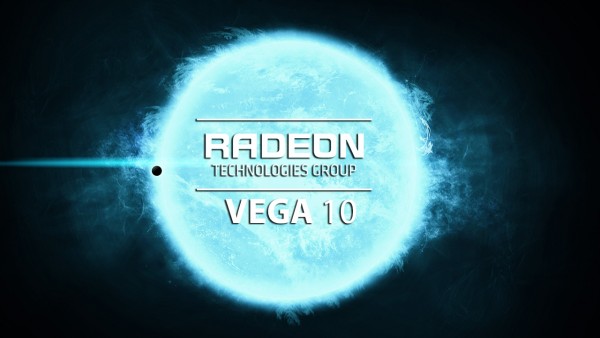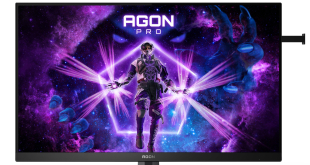Following on from the first RX Vega benchmark leak earlier this week, a Linux graphics driver patch has released, in which traces of the GPUs specs have been found. Cracking open the driver and scrolling through its many, many lines of code reveals the number of shader engines, compute units, texture mapping units and ROPs embedded in Vega 10.
From the 64 compute units and 64 shader engines, you can reach the much-discussed 4096 stream processors Vega is said to have. There are still quite a few questions about the chip design, including a rumoured new direction in tile-based rendering which will save GPU processing power and make the chip more efficient than Fiji, AMD's last flagship GPU architecture.
While Vega 10 was the highlight here, the folks over at ComputerBase.de spotted something we missed the first time around. There is a string of code found in the driver pertaining to Raven Ridge, AMD's next APU, based on Zen. It seems Raven Ridge may also feature a Vega-based iGPU, on top of Zen-based CPU cores.
While Vega still has no launch date, it is widely presumed to be launched at Computex 2017 right at the end of May.
KitGuru Says: It seems that AMD has taken quite a lot of what made Fury X a good GPU, and the Linux driver provides a more solid base for performance assumptions. However, there are still questions that need to be answered, especially if Vega is going to launch with multiple SKUs.
 KitGuru KitGuru.net – Tech News | Hardware News | Hardware Reviews | IOS | Mobile | Gaming | Graphics Cards
KitGuru KitGuru.net – Tech News | Hardware News | Hardware Reviews | IOS | Mobile | Gaming | Graphics Cards




they said in a leak this is going to be a 1070 at best my guess
They had one leak that showed 1070 and another showing beyond 1080 Ti. However even in AMD fan forums they believe the one showing 1080 Ti+ perf is a fake.
The trip hazard here is the biggest unknown: base clock. Vega is literally just the codename of a 14nm version of Fiji, no different than what nVidia did with Pascal, it’s just a shrink Maxwell. Except nVidia did up the core count a bit.
Anyway, if AMD left the clock down around 1GHz, it would match Fury-X while using less power, which is where GTX1060 stands today.
Raise it to 1200MHz and you get GTX1070, raise further to the upper 1400 and you near GTX1080, and if AMD managed 1675+, that’s GTX1080 Ti territory.
My point is Vega’s performance only depends on what clock they manage. Whatever you think is realistic. I’m pretty sure 1600MHz is not on the table.
At most the fury cards were ok GPU based cards. They had lots of power that never got used. Something in the design was a bottleneck that made them slower than expected. Lets hope Vega does not have that bottleneck as well. It is pretty bad when a 390x or 480 overclocked can match or beat a Fury card.
Vega isnt just Fiji shrunk to 14nm….not sure where you get that from. AMD have stated they have made quite a few architectural changes apart from just having HBM2 memory support, one being improved shader IPC, tile based rendering, HBCC and a few others I cant remember. Now how well these changes are implemented in Vega we’ll have to wait and see…
Never an clock speeds 🙁
Concerning Fiji and Fury X, nowadays the AMD card beats the GTX 980 Ti in ANY game outside the MafiaWorks protective environment.
Go have a look.
False.
You’re a distracted one. Can you tell WHICH ONE of the already announced many iterations of Vega was compared to (and beat) a GTX 1070?
Because IF it is the slowest one, then it profiles a very dark and grim period for Nvidia.
Don’t say “Volta”, because “Navi” is already approaching.
Fury X could run MOST titles of the time at 4K… There weren’t many… nVidia was sometimes faster at 1440p but fell off at 4K…
Pascal uses tiled-rendering, which is why it has the advantage over Polaris… They mentioned rumors of it in Vega… With all the other things, it should be 60% or more faster than Fury X (like most next archs)…
Most 1080Ti reviews show Fury so you can see what 60% would mean…
The latest RX 580 is running at 1500MHz factory OC and with greater power efficiency it should easily get there…
It’s a new GCN… It has NCUs now with rapid packed math (should improve game perf since they don’t need 32bit FP), a new pixel engine, a new geometry engine, a totally updated command processor, Infinity Fabric to connect Shader groups, HBM2, pixel removal, etc…
It should be really fast…
They were a month or two apart…
Yup I’m hoping it is. Im just being cautiously optimistic and not getting my hopes up too high.
Google is paying 97$ per hour! Work for few hours and have longer with friends & family! !mj170d:
On tuesday I got a great new Land Rover Range Rover from having earned $8752 this last four weeks.. Its the most-financialy rewarding I’ve had.. It sounds unbelievable but you wont forgive yourself if you don’t check it
!mj170d:
➽➽
➽➽;➽➽ http://GoogleFinancialJobsCash170TopLifeGetPay$97Hour… ★★✫★★✫★★✫★★✫★★✫★★✫★★✫★★✫★★✫★★✫★★✫★★✫★★✫★★✫★★✫★★✫★★✫★★:::::!mj170d..,.
I courageously predict this ~1yo concept gpu feature for high end vegaS:
http://www.anandtech.com/show/10518/amd-announces-radeon-pro-ssg-fiji-with-m2-ssds-onboard
Presumably, gpus have plenty of spare data lanes for internal use, a ~6 lane pcie3 raid0 pair of nvmeS built onto the gpu could approach 6GBps for large local storage, independent of the cpu & pc bus.
(on a pcie3 m.2 nvme nand ssd we get ~2.5GBps, and raid 0 is an overall bump of ~50%, & ~30% bump in maximum performance sequential reads – but thats a PC, it may be simpler and faster if just a local GPU resource.), which extrapolates to 2.5GBps + 30% = 3.25GBps, read AND WRITE in a pc context.
Its better bandwidth than it seems, as its independent of competing demands on other processors & system bandwidth.
It is a potentially very powerful new facility for a gpu.
It ties in well with the Vega feature of using system memory or even storage as virtual vram, yielding huge gpu work space if desired.
AMD seem to be evangelising a layered gpu memory philosophy.
Noting that:
Vegas hbm2 vram is much faster than gddr5, and incidentally, removes THE major obstacle to gpu progress
But, HBM2 is of restricted size ATM, & they have been pushing the Vega line, that 4gb of hbm2 is still a damn good card, or, that 8GB vram is ok, even tho others offer 16gb ddr5 cards.
BUT
If, concurrently, they can offer ~unlimited (512TB) virtual vram via their well executed layered approach of adding system memory and ssd storage to available vram.
In this example, 1 TB of virtual VRAM as i recall. A whole movie could sit in vram during processing, & make few demands on non gpu resources.
As the story says, coders may need a little discernment using it, to avoid thrashing the SSDs.
Speaking of crystal ball gazing by extrapolating from known philosophies, multi gpu on the one “ccx” is a very short jump from 2 zen core units (each 4 core) per ccx on ryzen, and a vega gpu and a zen core unit on one ccx comprises the raven ridge apu, then 2 x vega gpu on one ccx seems a simple next step for them.
Clearly they plan to take the concept further, in the form of Naples (? – famous for pick pockets and unfortunate volcanic events 🙂 ) – a 16 core cpu, using a modified ccx with 4 x zen core units.
So maybe quad vega gpu single cards will happen also?
I would love feedback/thoughts from any coders out there.
Somewhere in between seems most likely.
My own estimates put it in between 1080 and 1080 Ti for gaming performance.
Honestly can’t see a 1070 competing with 4000 core Vega, even if the 1070 is heavily overclocked. Architectural gains should give it a huge boost over Fury X (which traded blows with stock 980 TIs). No logical reason why it would have such a small boost to only trade blows with a 1070.
Seems most likely to beat GTX 1080 in most titles, and compete favourably with 1080 Ti in a few games that work well with AMD. But again no evidence I’ve seen points to it being a 1080 Ti beater. Even if it ends up being really close to 1080 Ti (like RX 480 vs 1060) then it would have exceeded all my expectations.
Yup, this isn’t just a die shrink.. is there even such thing as only a die shrink? nope every time there’s macro-level architectural improvements & adjustments
The biggest variable would be the software used. If its serialized and its hitting 1080 Ti performance, we’ll see the perf of VEGA go even further in low level API’s that are heavily parallel. I don’t personally use the benchmarking software that was used to show it off, so as far as I know it is heavily parallel. But if it is serialized…Nvidia has something to worry about on the high end side.
Hopefully. I like competition.
Maybe the 1070 competitor is the rumoured small Vega?
We’re certain to get at least two different Vega cards.